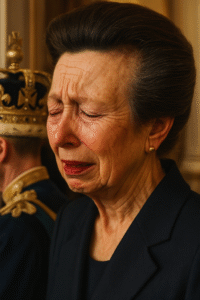
No one expected it to happen so soon.
In a quiet corner of Sandringham, far from the royal pomp and the flash of cameras, King Charles III — barely a few years into his reign — uttered words that would forever change the course of British history:
“My reign ends now.”

It wasn’t a palace announcement. It wasn’t a televised celebration. It was a deeply human moment between a fading father and a stunned son. For months, Charles had been battling a silent war. The Palace released carefully worded updates — “rest,” “treatment,” “light duties” — but those close to the monarch knew the truth was far darker. His strength was fading. His days, numbered.
Then came the collapse. A private meeting with Prince William turned into a medical emergency. Doctors, summoned in haste, delivered the brutal news:
“You have months. Not years.”
The King’s heart was heavy. But it wasn’t only his illness that moved him. It was Catherine — the Princess of Wales — who had just clawed her way back from cancer. Watching her recover, watching her smile again for their children, awakened something inside him. He realized: Britain couldn’t bear to watch two royals wage the same war at once.

And so, he made a choice — not of defeat, but of devotion.
The next morning, in the very room where Queen Elizabeth once addressed her people at Christmas, Charles stood beneath her portrait. Cameras rolled. A trembling hand unfolded the parchment. His voice, cracked but clear, delivered the shock heard around the world:
“I am abdicating the throne. Effective immediately.”
Gasps. Tears. Silence.
William and Catherine were named as his successors. There would be no transition period, no gradual handover. One era ended. Another began — abruptly, emotionally, irrevocably.

